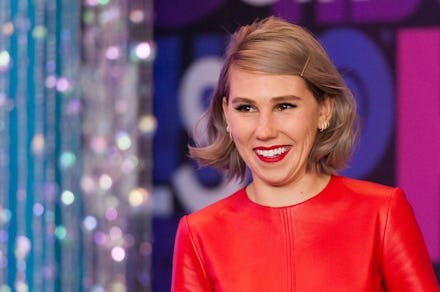Zosia Mamet Just Said the One Thing Any Woman Looking for "Mr. Right" Needs to Hear

How often do we stay in relationships that aren't right because we fear that there are no better options left? How often does the fear of being alone convince us that being with someone "just fine" is better than being with nobody at all?
We're so determined to end up with someone right, out of fear of ending up with no one, that we end up staying in relationships with people who are wrong for us — something Girls star Zosia Mamet has lived through.
In her column in Glamour this week, Mamet recalled what she learned from staying in a year-long relationship when she "knew with every fiber of my being [it] was wrong for me." Mamet writes (emphasis added):
"A huge part of it wasn't necessarily a fear of being alone, but a fear of throwing away a good apple, maybe the last good apple. We're brought up on these tales of Cinderella and Snow White, the lonely girl finally meeting her Prince Charming and being whisked away into the sunset. ... So when someone comes along who's 'good on paper,' we hold on for dear life, even if being with that person, off paper, in reality, feels like shit."
It's a common fear women have: If we leave a steady relationship, we worry it might be our last good option. We're so determined to end up with someone, the fear of ending up with no one is strong enough to convince us to stay.
The scientific urge to settle: A study published in Scientific Reports in 2014 explains why staying in relationships, even if they're not great, is our go-to. As reported by Mic, "When studying the nature of risk aversion, evolutionary researchers at [Michigan State University] found that when the stakes are high, such as when we might mate or not, it's in our nature to take the safe bet." Settling with Mr. Right Now versus waiting for Mr. Right is an evolutionary strategy.
But, as researcher Randal Olson told the Blaze, there's a counterpoint to settling in the modern world: "Conceivably, since we're now evolving in huge populations in an increasingly connected world, it's more likely that 'risky' strategies of waiting for 'Mr. Right' are better." In fact, sentiments like "all the good ones are taken" seem antiquated in an era in which the majority of American adults (50.2%) are single.
As Mamet points out, we don't need to give into the fear that other options don't exist; they do. But more importantly, there isn't only one right choice.
The cult of "the one": Ironically, our society's emphasis on finding "the one" leads many people, especially women, to stay in relationships that may not be valuable to them.
As one Huffington Post blogger put it, "Girls these days go to college, get amazing jobs, make six figures, but they still feel that if they aren't in a steady relationship that there is something wrong with them." Since ending up in a relationship is the ultimate goal, ending up alone is painted as the Worst Possible Destiny. And that assumption leads us to stay in relationships for fear that there are no other options out there.
But realizing that no one's forcing you to either settle or go alone is freeing. For one, "too late" is becoming a foreign concept, particularly when it comes to family — many healthy women can safely give birth past 35 years old and into their 40s. Modern technology as well as shifting career trajectories are creating a space for women to have relationships and families when they're actually ready for them.
Moreover, time spent without someone can be incredibly valuable. Sara Eckel, author of It's Not You: 27 (Wrong) Reasons You're Single, realized this when she was 39 years old and hadn't had a serious relationship in eight years. "A lot of good things happened during my period of constructing Sara 2.0," Eckel wrote in the New York Times. "I went to artists' colonies, taught storytelling to young people from disadvantaged backgrounds, adopted a rescue dog, learned to do a handstand — all under the banner of 'Learning to Love My Single Life.'"
She didn't settle, but she also didn't submit to a depressing life of loneliness. In the process of simply embracing life without a partner, she ended up finding one. And along the way, she found herself.
That's why Mamet's argument is so dead-on. When we do stay in bad relationships, we can waste essential years of our lives — years we could spend happily alone, exploring new partners or building up other interests (like our careers).
That doesn't mean we should endlessly search for the perfect person, of course. Experts and writers such as Lori Gottlieb make the point that focusing on "the one" too often sends people in a perpetual state of dissatisfied searching. Too many women, she told the New York Times, worry about the wrong thing: "Instead of wondering, 'Am I happy?' they wonder, 'Is this the best I can do?'"
But that's exactly Mamet's point: Perfection isn't the goal, but happiness is. We should "settle" for the relationships that make us the happiest. It's not a question of choosing between waiting for Mr. Right or settling for Mr. Right Now. The real trick is knowing when settling with your current partner is the right choice — and being willing to let go when it's not.